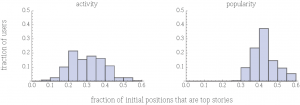Buzzfeed is one of the more interesting sites on the web. In terms of popularity and visitor numbers, it is hard to argue that it is one of the most successful websites online. They regularly get more visits than some of the biggest names in publishing. It’s in that success that many contend the problem lies, for you see many regard Buzzfeed as trashy, lowest common denominator content that is designed purely to get page views. Whilst it is undoubtedly successful in that endeavour, it does little to advance humanity.
A paper, published recently by the University of Southern California, suggests that the reason behind this is not because Buzzfeed and their ilk concentrate on writing great content, but rather they focus instead on creating herd behaviour amongst their readers.
It’s well known that a huge chunk of content is created every minute of the day, so standing out is often a lot more than simply being great content. Whilst Buzzfeed and sites like them, aren’t likely to win any journalistic prizes, they do attract the pageviews, which in turn attracts advertising spend, so in many ways they are practicing a strong business model.
The researchers evaluated numerous peer recommendation strategies, and analyzed their ability to pick out strong content. They used this to determine both what content people like, and then they evaluated the impact the position on a webpage of that content on our judgements of the content.
“Psychologists have known for decades that position bias affects perception: people pay more attention to items at the top of a list than those below them,” said University of Southern California computer science professor Dr. Kristina Lerman. “We were surprised, however, how strongly this affected user behavior and the outcomes of recommendation.”

The researchers discovered that readers will give five times as much attention to material posted near the top of the page as they will that posted lower down. This is reasonably well known from heat map studies and landing page optimization, but of course in our peer recommendation age, where a great deal of content is ordered according to recommendations, it can potentially create a very strong herd effect, whereby users rate what is already popular, and overlook new articles.
The researchers found that a better way to counter this would be to order content by the recency of a recommendation rather than its total number of likes. Of course, any peer recommendation system can be gamed to ensure certain content regularly appears near the top, and a recent post highlighting the persuasive powers of the latest breed of Twitter bots shows how even a chronologically based system such as Twitter’s can be gamed.
For me, this underlines the importance of having a wide and varied source of content rather than relying on one or two sources for your information. This way you’ll hopefully avord the herd effect and ensure you get sufficient content to be suitably informed on the issues that matter to you.
Sounds like basic landing page optimization to me. I mean it's always been the case that content above the fold gets more views hasn't it?
That's fine in environments where the page owner determines the layout of things though. On social sites it is often peer reviews that determine placement. It's more like another example of how strength begets strength (or popularity begets popularity) on social sites.
Fair point, yes, that's true. Seem to remember you posting a similar thing about Kickstarter a while back?
Yes, that's it. A study showed that if you give a Kickstarter campaign a 'head start' with an infusion of early investments, then they outperform those campaigns that are deprived such an advantage.